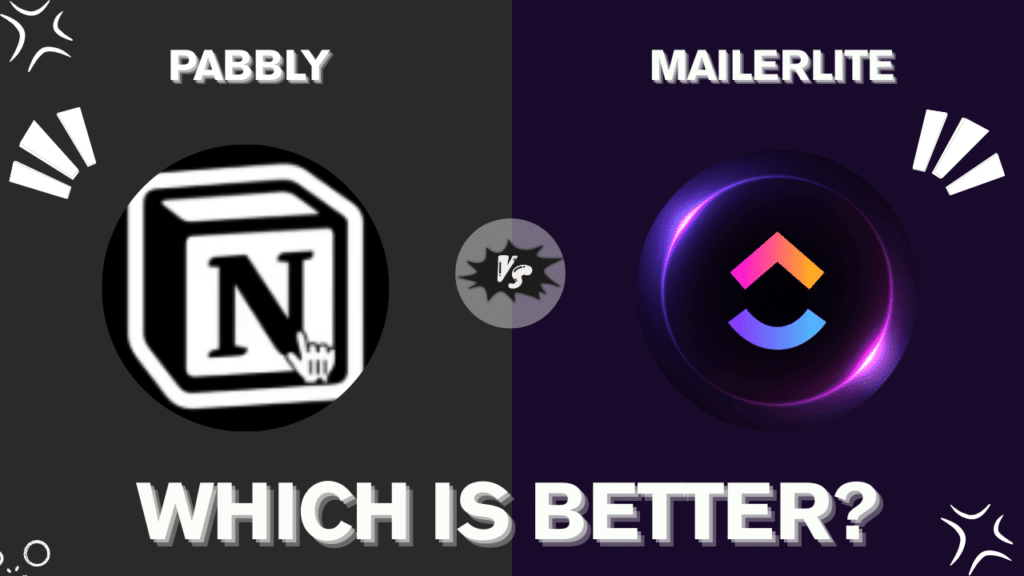ClickUp is better for teams needing robust project management capabilities, while Notion excels for individuals and small teams prioritizing knowledge management and documentation. ClickUp delivers superior task management with advanced features like time tracking, workload views, and built-in automations that Notion lacks. Notion provides a more intuitive interface with unlimited nested pages and superior document creation capabilities that make it ideal for organizing information and collaborative documentation.
Core Differences Between These Productivity Platforms
ClickUp dominates in project management functionality with robust features. The software includes advanced task management, time tracking, and reporting tools that outperform Notion’s more basic project capabilities.
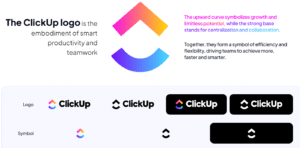
Notion excels in knowledge management and documentation. The platform delivers superior note-taking, wiki creation, and information organization through its flexible page structure and block-based editor.
The fundamental choice comes down to your primary need. ClickUp provides better structure for managing complex projects and team workflows, while Notion offers more flexibility for organizing information and creating beautiful documentation.
Your team size and complexity will significantly impact this decision. ClickUp works better for larger teams with complex project needs, while Notion serves individuals and smaller teams focused on collaboration and information sharing.
User Interface and Experience
Notion prioritizes simplicity with an intuitive, clean interface. The platform features a minimalist design that new users can quickly master without extensive training.
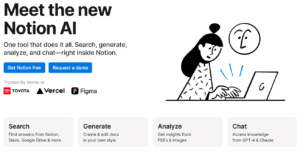
ClickUp presents a feature-rich but potentially overwhelming interface. The system includes more menu items and options, reflecting its greater functionality but creating a steeper learning curve.
The page creation experience differs dramatically between platforms. Notion uses a block-based editor where everything is a page that can contain other pages, while ClickUp separates documents from tasks with less flexibility.
Navigation efficiency varies between tools. Notion provides a more straightforward navigation experience with its nested page structure, while ClickUp organizes content through a more complex hierarchy of Workspaces, Spaces, Folders, Lists, and Tasks.
The mobile experience creates another point of differentiation. ClickUp offers a more full-featured mobile app with better performance, while Notion’s mobile experience feels heavier and slower despite recent improvements.
| Feature | Notion | ClickUp |
|---|---|---|
| Primary Strength | Knowledge management, documentation | Project management, task tracking |
| User Interface | Clean, minimal, intuitive | Feature-packed, modern, dense |
| Learning Curve | Gentle, beginner-friendly | Steeper, more complex |
| Best For | Notes, docs, knowledge base, small teams | Teams, complex project management |
| Task Management | Basic capabilities | Advanced features |
| Document Creation | Block-based pages, excellent | Built-in docs, good |
| Templates | Community-driven, aesthetic | 100+ built-in, practical |
| Automations | Limited (via Zapier, Make) | Built-in, extensive |
| Time Tracking | Requires integration | Native tracking |
| Offline Access | Limited | Full functionality (desktop) |
| Pricing (Starting) | $0-$15/user/month | $0-$12/user/month |
| Mobile App | Improved but slower | Full-featured, more performant |
| Customization | Extremely flexible | Extensive but structured |
| Hierarchy | Unlimited nested pages | Workspace > Space > Folder > List > Task |
| Views | Table, list, calendar, Kanban, gallery, timeline | List, board, calendar, Gantt, workload, map, form |
| AI Capabilities | Content-focused AI ($10/month) | Project-focused AI ($5/member/month) |
| Collaboration | Comments, mentions, sharing | Chat, comments, email, video recording |
| Integrations | Limited (Zapier, Slack, GitHub, Google Drive) | 1,000+ direct integrations |
| Security | AES-256 encryption, 2FA | AES-256 encryption, 2FA, HIPAA compliance |
Project and Task Management Capabilities
ClickUp provides comprehensive project management tools designed for complex workflows. The platform includes Gantt charts, workload views, sprint planning, and time tracking that Notion simply doesn’t match.
Notion offers basic task management with limited project features. The system can create tasks through databases but lacks the depth and specialized tools that ClickUp provides for serious project management.
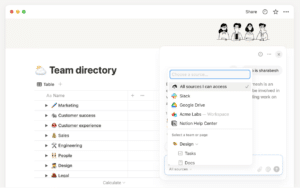
The task organization approaches differ significantly. ClickUp uses a structured hierarchy with Workspaces, Spaces, Folders, Lists, and Tasks with up to 7 levels of subtasks, while Notion relies on linked databases with more limited task relationships.
View options create another distinction between platforms. ClickUp offers more specialized views including List, Board, Calendar, Gantt, Workload, Map, and Form views, while Notion provides Table, List, Calendar, Kanban, Gallery, and Timeline views with less project-specific functionality.
The time tracking capabilities represent a major functional difference. ClickUp includes native time tracking for tasks, while Notion requires third-party integrations to track time spent on activities.
| Project Management Features | Notion | ClickUp |
|---|---|---|
| Task Management | Basic database entries | Advanced with subtasks |
| Project Views | 6 view types | 7+ specialized views |
| Time Tracking | Requires integration | Built-in |
| Gantt Charts | Limited functionality | Comprehensive |
| Workload Management | Not available | Built-in workload view |
Documentation and Knowledge Management
Notion excels at document creation and knowledge organization. The platform’s block-based editor creates beautiful, flexible documents with nested pages that serve as an excellent knowledge base.
ClickUp offers built-in documentation capabilities but with less flexibility. The system includes Docs as a separate feature from tasks, lacking the seamless integration between information and action that Notion provides.
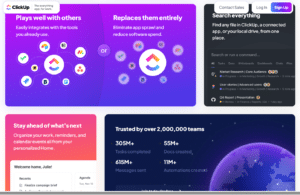
The information hierarchy approaches differ fundamentally. Notion treats everything as a page that can contain other pages with unlimited nesting, while ClickUp separates documents from its project management hierarchy.
Wiki creation capabilities favor Notion significantly. The platform’s backlinks, nested pages, and flexible structure make it ideal for creating interconnected knowledge bases and company wikis.
The document collaboration experience varies between platforms. Notion provides a more intuitive collaborative editing experience, while ClickUp offers more structured collaboration through comments and assignees.
| Documentation Features | Notion | ClickUp |
|---|---|---|
| Document Editor | Block-based, flexible | Traditional, functional |
| Knowledge Base | Excellent with backlinks | Good but less integrated |
| Page Nesting | Unlimited | Limited |
| Media Embedding | Extensive options | Good capabilities |
| Template Gallery | Community-driven | Pre-built templates |
Collaboration and Team Features
ClickUp delivers more comprehensive team collaboration tools. The platform includes chat view for real-time conversations, email view for sending messages within the app, and video recording for visual communication.
Notion provides simpler but effective collaboration features. The system relies primarily on comments, mentions, and shared pages rather than the specialized communication tools ClickUp offers.
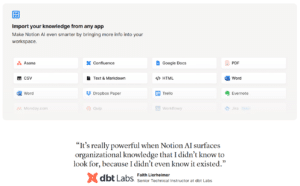
The permission management approaches differ in complexity. ClickUp provides more granular permission controls for teams, while Notion offers simpler sharing options that work well for smaller groups.
Real-time collaboration capabilities exist in both platforms. Both Notion and ClickUp allow multiple users to work on the same content simultaneously, though Notion’s implementation feels somewhat more seamless.
The team organization features favor different workflows. ClickUp’s structured approach works better for teams with defined roles and processes, while Notion’s flexibility benefits teams with more fluid collaboration needs.
| Collaboration Features | Notion | ClickUp |
|---|---|---|
| Communication Tools | Comments, mentions | Chat, comments, email, video |
| Permission Controls | Basic sharing | Granular permissions |
| Real-time Editing | Smooth implementation | Available |
| Team Organization | Flexible, less structured | Hierarchical, more defined |
| Notification System | Basic | Comprehensive |
Automation and Integration
ClickUp includes built-in automation capabilities across plans. The platform allows users to create custom automations and workflows without requiring third-party tools or advanced technical knowledge.
Notion lacks native automation features. The system requires integration with platforms like Zapier or Make to achieve the automation capabilities that come standard with ClickUp.
The integration ecosystem differs dramatically between platforms. ClickUp offers 1,000+ direct integrations with other tools, while Notion provides a more limited set of native integrations.
API access and developer options favor ClickUp for customization. The platform provides more robust API capabilities for developers, though Notion has been expanding its API access.
The workflow customization potential varies between platforms. ClickUp enables more sophisticated automated workflows, while Notion requires more manual processes or third-party automation tools.
Pricing and Value Proposition
Notion structures its pricing around user access and advanced features. The platform offers a free plan with basic features, Plus at $8/user/month, Business at $15/user/month, and Enterprise with custom pricing.
ClickUp bases its pricing on feature access with competitive rates. The system provides a free plan, Unlimited at $5/user/month, Business at $12/user/month, Business Plus at $19/user/month, and Enterprise with custom pricing.
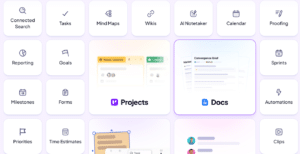
Feature accessibility across plans creates different value equations. ClickUp includes more advanced features in its lower-tier plans, while Notion reserves some capabilities for higher tiers.
The overall value proposition depends on specific needs. Notion delivers better value for documentation and knowledge management, while ClickUp provides superior value for project and task management.
AI Capabilities and Future Development
ClickUp focuses its AI features on project management enhancement. The platform offers AI for summarizing threads, generating subtasks, and rewriting documents at $5/member/month as an add-on.
Notion emphasizes content creation with its AI implementation. The system provides writing assistance and content enhancement at approximately $10/month, focusing more on document quality than project management.
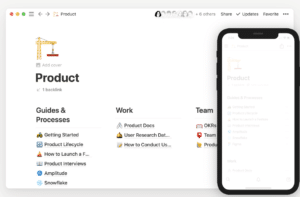
The AI implementation approach reflects each platform’s core strengths. ClickUp applies AI to improve project workflows and efficiency, while Notion leverages AI to enhance content creation and organization.
Future development trajectories align with these different focuses. ClickUp continues expanding its project management capabilities, while Notion enhances its knowledge management and documentation features.
The innovation pace remains strong for both platforms. Both Notion and ClickUp regularly introduce new features and improvements, though their development priorities reflect their different core competencies.
My Recommendation
Most teams should choose ClickUp if project management represents their primary need. The platform delivers superior task management, time tracking, and team collaboration features that outperform Notion for structured project work.
Individuals and small teams focused on knowledge management should select Notion. The platform provides a more intuitive interface for organizing information, creating documentation, and building connected knowledge bases.
The deciding factor comes down to your primary workflow challenge. If you struggle most with managing complex projects and team coordination, ClickUp delivers better value; if organizing information and creating documentation represent your biggest hurdles, Notion offers the superior solution.
Your team size and structure will significantly impact this decision. Larger teams with defined roles typically benefit more from ClickUp’s structured approach, while smaller teams and individuals often prefer Notion’s flexibility.
The platform that aligns with your existing workflow will deliver the most value. ClickUp works better for traditional project management processes, while Notion excels for more fluid, information-centric workflows.
Frequently Asked Questions
Q: Which platform is easier to learn and use, Notion or ClickUp?
A: Notion offers a more intuitive and beginner-friendly experience with its clean, minimal interface and block-based editor. The platform receives a 9.2/10 ease-of-use rating compared to ClickUp’s more complex interface, which scores around 8.6/10. ClickUp’s feature-rich environment creates a steeper learning curve, requiring more time to master its extensive capabilities. For new users or those prioritizing simplicity, Notion provides a gentler entry point, while ClickUp rewards the learning investment with more powerful project management features.
Q: How do the task management capabilities compare between Notion and ClickUp?
A: ClickUp delivers significantly more robust task management capabilities than Notion. The platform includes advanced features like native time tracking, workload views, multiple task dependencies, custom fields, and up to 7 levels of subtasks. Notion offers more basic task management through its database functionality, lacking specialized features like time tracking, workload management, and advanced dependencies. For serious project management, ClickUp provides a more comprehensive solution, while Notion’s task management works adequately for simpler needs.
Q: Which platform offers better document creation and knowledge management?
A: Notion excels at document creation and knowledge management with its flexible block-based editor and unlimited nested pages. The platform creates beautiful, interconnected documents with backlinks, databases, and media embedding that form excellent knowledge bases and wikis. ClickUp offers built-in Docs but lacks the seamless integration between information and action that Notion provides. For teams prioritizing documentation, knowledge bases, or wikis, Notion delivers superior capabilities and a more intuitive experience.
Q: How do the pricing models compare between Notion and ClickUp?
A: Both platforms offer competitive pricing with free plans and tiered paid options. Notion’s paid plans range from $8-$15 per user/month, while ClickUp’s range from $5-$19 per user/month. ClickUp generally provides more project management features at each tier, while Notion offers better knowledge management capabilities. The value proposition depends on your primary needs—ClickUp delivers better value for project-focused teams, while Notion provides better value for documentation and information organization.
Q: Can either platform work offline?
A: ClickUp offers superior offline functionality through its desktop application, allowing users to work with full functionality without internet connection. Notion provides more limited offline capabilities, requiring pages to be preloaded before going offline and lacking full offline support. For users frequently working without reliable internet access, ClickUp’s offline capabilities represent a significant advantage.
Q: Which platform has better team collaboration features?
A: ClickUp provides more comprehensive team collaboration tools, including chat view for real-time conversations, email view for sending messages within the app, video recording for visual communication, and more granular permission controls. Notion offers simpler but effective collaboration through comments, mentions, and shared pages. For larger teams with complex collaboration needs, ClickUp delivers more specialized tools, while Notion works well for smaller teams with straightforward collaboration requirements.
Q: How do the mobile apps compare between Notion and ClickUp?
A: ClickUp offers a more full-featured and performant mobile application that provides better access to its project management capabilities on mobile devices. Notion’s mobile app has improved recently but remains heavier and slower, with some limitations compared to its desktop version. For users who frequently need to manage projects or access information on mobile devices, ClickUp’s superior mobile experience may represent a significant advantage.

